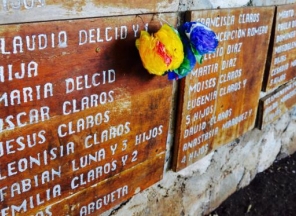
On Thursday, May 11, General José Guillermo García, the highest ranking military official indicted for the El Mozote massacre, must testify before Judge Jorge Guzmán Urquilla in a trial court of San Francisco Gotera, Morazán, El Salvador.
The crimes under investigation took placed in December 1981, while Garcia served as Minister of Defense. Thus far, abundant testimonial and scientific evidence has been presented by private prosecutors from the organization representing victims, Tutela Legal María Julia Hernández. In 2016, Garcia was deported from the United States for his involvement in this and other violations of human rights, and since that time he has lived in El Salvador.
This is the first judicial process for the atrocities that occurred during the internal armed conflict that lasted between 1980 and 1992, having been reopened after the declaration of unconstitutionality of the Amnesty Law in August 2016.
The massacre
On March 29th and 30th, twelve of the eighteen former military officers indicted in the case, including García, were brought before the same court to be notified of nine criminal charges against them, including murder and aggravated rape. DPLF was present as an international observer is this important hearing.
The El Mozote massacre refers to a series of massacres against civilians committed by the Atlacatl battalion of the Armed Forces during a military operation carried out December 10- 12, 1981, in the villages of El Mozote, Ranchería, Jocote Amarillo, Cerro Pando, Cerro Ortiz, La Joya and Los Toriles, in the north of the department of Morazán.
According to the UN Truth Commission for El Salvador, approximately 900 Salvadoran peasants, women and children were killed in that operation. It is considered the largest act of violence against civilians committed by state agents in the Salvadoran war, and the worst massacre in the region in modern history.
In December 2012, the Inter-American Court of Human Rights condemned the State of El Salvador for these acts, pointing out that they constituted serious violations of human rights and that they had the necessary elements to qualify as international crimes.
What comes next
It is expected that in the coming weeks, the remaining six accused military officers will be notified of the charges against them and appear in court, and that all defendants will provide testimony. The judge must decide whether to issue arrest warrants, whether the acts qualify as international crimes in addition to the relevant national classifications, and the applicable procedural law, among other points.
DPLF will continue to monitor the results of this historic process. In this context we will present an amicus brief to support the progress of the case so that victims may obtain justice.
More information:





